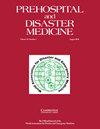The Impact of Alcohol-Related Presentations to Emergency Departments on Days with a Public Holiday or Sporting Event: A Retrospective Cohort Study
IF 2.5
4区 医学
Q2 EMERGENCY MEDICINE
引用次数: 0
Abstract
Introduction: The consumption of alcohol within the Australian community continues to rise, impacting care delivery in already over-burdened emergency departments (EDs). Study Objective: This study aimed to examine the impact of alcohol-related presentations (ARPs) to EDs on days with a public holiday or sporting event. Methods: A retrospective cohort study was undertaken using routinely collected health data pertaining to patient presentations diagnosed with an alcohol-related disorder (ICD-10-AM code F10) to two EDs in Queensland, Australia from January 1, 2016 – December 31, 2020. Descriptive and inferential statistics were used to describe and compare ARPs on event days versus non-event days and uncomplicated versus other ARPs on event days only. Results: Of all 5,792 ARPs, nine percent (n = 529) occurred on public holidays or sporting event days. When compared by day type, type of presentation, mode of arrival, and day of week differed between event and non-event days. On event days, uncomplicated ARPs differed to other ARPs, with uncomplicated ARPs being younger, having shorter median length-of-stay (LOS), and less likely to be admitted to hospital. Conclusions: In this multi-site study, public holidays and sporting events had a noteworthy impact on ARPs to EDs. Focused refinement on the clinical management of uncomplicated ARPs is warranted to inform future resource allocation, including on event days.公共节假日或体育赛事当天急诊科接诊酒精相关病例的影响:回顾性队列研究
导言:澳大利亚社区的饮酒量持续上升,对已经不堪重负的急诊科(ED)的医疗服务造成了影响。研究目的:本研究旨在探讨公共节假日或体育赛事对急诊科酒精相关就诊(ARP)的影响。研究方法:使用常规收集的健康数据,对澳大利亚昆士兰州两家急诊室 2016 年 1 月 1 日至 2020 年 12 月 31 日期间诊断为酒精相关疾病(ICD-10-AM 代码 F10)的患者就诊情况进行回顾性队列研究。研究采用描述性和推论性统计方法来描述和比较事件日与非事件日的 ARP,以及仅事件日的无并发症 ARP 与其他 ARP。结果:在所有 5,792 例 ARP 中,9%(n = 529)发生在公共节假日或体育赛事日。按日类型进行比较,事件日和非事件日的发病类型、到达方式和星期都有所不同。在活动日,无并发症的急性急性呼吸道综合症患者与其他急性急性呼吸道综合症患者不同,无并发症的急性急性呼吸道综合症患者更年轻,中位住院时间(LOS)更短,住院的可能性更小。结论:在这项多地点研究中,公共节假日和体育赛事对急诊室的 ARP 有显著影响。有必要对无并发症 ARP 的临床管理进行重点改进,以便为未来的资源分配(包括在赛事日的资源分配)提供依据。
本文章由计算机程序翻译,如有差异,请以英文原文为准。
求助全文
约1分钟内获得全文
求助全文
来源期刊

Prehospital and Disaster Medicine
Medicine-Emergency Medicine
CiteScore
3.10
自引率
13.60%
发文量
279
期刊介绍:
Prehospital and Disaster Medicine (PDM) is an official publication of the World Association for Disaster and Emergency Medicine. Currently in its 25th volume, Prehospital and Disaster Medicine is one of the leading scientific journals focusing on prehospital and disaster health. It is the only peer-reviewed international journal in its field, published bi-monthly, providing a readable, usable worldwide source of research and analysis. PDM is currently distributed in more than 55 countries. Its readership includes physicians, professors, EMTs and paramedics, nurses, emergency managers, disaster planners, hospital administrators, sociologists, and psychologists.
 求助内容:
求助内容: 应助结果提醒方式:
应助结果提醒方式:


